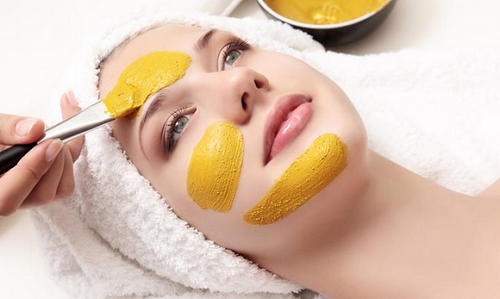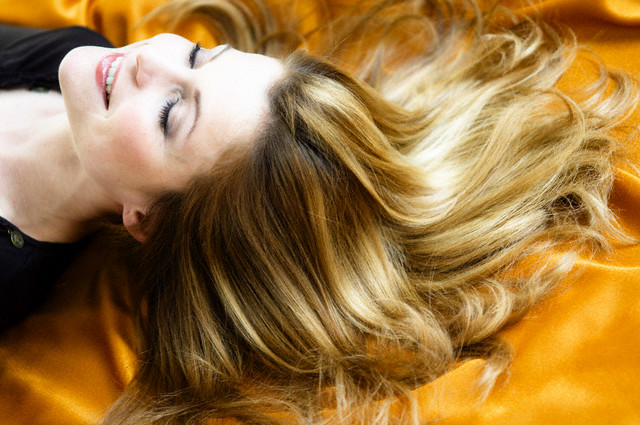Excellent Exfoliating Agent
Being an excellent exfoliating agent, turmeric can help eliminate signs of aging. You can make a paste by mixing besan (gram flour) and turmeric powder in equal proportions with water. This paste can also be prepared in raw milk or even yoghurt. Apply it evenly on your body and allow it to dry. Rinse off with lukewarm water and scrub your face gently in circular motion.
Treatment of Stretch Marks
Turmeric can help lighten stretch marks. For this purpose, apply a mixture of besan (gram flour) and turmeric with yoghurt/raw milk/ water on the stretch marks.

Soothes Burns
Turmeric can provide quick relief in case of burns, thanks to its antiseptic properties. You can apply a mixture of turmeric and aloe vera gel on the burn and experience the wound heal in no time.
Reduction of Skin Pigmentation and Skin Tanning
To remove skin tanning and pigmentation, apply a mixture of turmeric powder and lemon or cucumber juice on the affected area for 20-30 minutes and wash off with plain water. This should be done regularly for beneficial results.
Removal of Facial Hair
You can make a facial scrub by mixing kasturi turmeric with chickpea (gram flour). Applying this on your face can inhibit facial hair growth. This paste should be applied consistently for about a month to get effective results.
Treatment of Cracked Heels
Turmeric is an excellent healing agent. If you have cracked heels, you can apply a mixture of 3 spoons of turmeric with a few drops of coconut or castor oil on your heels for 10 to 15 minutes before taking a bath. Doing this regularly will soften your heels.
Night Cream
You can apply a paste made from turmeric and milk or yoghurt on your face. Leave the mask overnight and rinse it off the next morning using a light cleanser. Alternatively, you can add a pinch of turmeric to your moisturizer and cleanse the next morning. This should be done twice a week to get beautiful, healthy and younger looking skin.
Treatment of Skin Conditions
Being a natural antiseptic, turmeric with milk is effective in treating skin conditions like poison ivy, eczema and psoriasis. Eczema is quite itchy and painful disease characterized by red scaly patches on skin. Topical application of a mixture of kasturi turmeric with milk can soothe the skin and reduce redness and inflammation.
Removes Dead Cells
Make a paste by mixing gram flour and turmeric with water and apply it on your body. Scrub gently while taking a bath. Doing this regularly can rid you of dead cells to give you a glowing and spotless skin. Applying a mixture of turmeric and milk on your face and lips can cleanse your face as well as act as a healing agent on your lips to treat dry and
chapped lips.
Turmeric For Hair
Not just the skin, turmeric can be beneficial for your hair in a number of ways. Use of turmeric with other ingredients can promote hair growth and can treat scalp conditions. Some of the turmeric benefits for hair are given below.
Treatment of Dandruff
Dandruff and other scalp issues can be treated by applying a mixture of turmeric and olive oil on your scalp before taking a shower. Leave it for 15 minutes and then wash off the mixture with a natural shampoo. It removes the signs of dandruff by increasing circulation in the scalp and providing nutrition to the hair follicles.

Prevents Hair Loss
Hair loss can take place due to various reasons like unhealthy diet, stress or disease. Curcumin is a component of turmeric that can inhibit the activity of growth agent beta one known as TGF beta one which causes the death of hair follicles resulting in hair loss. Turmeric mixed with honey and milk can be extremely beneficial as they reduce the negative effects on your hair.
Natural Hair Dye
The yellow hue of turmeric not only makes it usable as a textile dye but also as a natural dye for your hair to brighten your hair color. It can be combined with other yellow colored herbs and flowers such as saffron, calendula and chamomile tea. Boil this mixture and after cooling, pour it over your head. Leave for 15 to 20 minutes and wash off to get a vivid color.
Treatment of Scalp Conditions
Turmeric can be used in the treatment of various scalp conditions such as dermatitis and eczema that can lead to itchy, flaky skin, inflammation and thinning hair. Cicatricial alopecia is a scalp ailment caused by inflammation that damages the hair follicles and prevents growth of new hair. Fungal infections can also cause hair loss. Curcumin, an active ingredient in turmeric is effective against these ailments due its antifungal, anti-inflammatory, anti-allergic, antioxidant, antiseptic and antibacterial properties.
Turmeric For Health
Turmeric is said to prevent cancer and childhood leukemia with the aid of its main component curcumin. It helps in detoxifying the liver, which further prevents the risk of hepatitis, cirrhosis and jaundice. It also aids in fat metabolism to help manage the weight along with improving digestion, reducing gas and bloating.
Turmeric extracts or bitters when taken twice a day daily for two weeks prior expected menstruation cycle will help reduce the monthly menstrual cramps in ladies. Turmeric has anti-bacterial properties along with anti- inflammatory and antiseptic properties! Thus, Turmeric is a good healing agent.
Turmeric boosts immunity on account of its strong antioxidant activity which fights off free radical attacks in the system. Its strong anti-inflammatory property acts against the development of rheumatoid arthritis and delays it.
When taken as supplements, turmeric aids in reducing joint pains. The anti-inflammatory and antioxidant properties also reduce inflation in brain, which is believed to be the main reason behind Alzheimer’s disease. This can therefore delay the onset of Alzheimer’s.
Turmeric regulates the homo-cysteine levels, and therefore through its interactions in the level, it controls the cholesterol level. The spice is hence useful to ward off cardiovascular diseases. Turmeric also moderates one’s insulin levels, thereby having a limited level of influence over diabetes control.
Videos
Disclaimer
The Content is not intended to be a substitute for professional medical advice, diagnosis, or treatment. Always seek the advice of your physician or other qualified health provider with any questions you may have regarding a medical condition.



